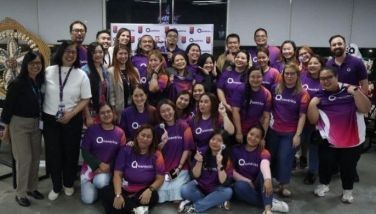In defense of honest NGOs

It is important to ensure that even in the midst of the most righteous crusade, there will be no collateral damage. In wars, these unwilling victims caught in the crossfire of contending parties are usually innocent civilians especially children.
In this current and just war against corruption, it seems that the most unfortunate victims or collateral damage are the legitimate non-governmental organizations or NGOs, who are now going to be excluded from any government funding if such a proposal is approved.
Perhaps one of Napoles’ greatest sin, together with the politicians allegedly involved in the pork barrel scam like Enrile, Marcos, Revilla, Sotto, Honasan, et al, is that they have tarnished the legitimate work done by dedicated and committed members of civil society.
NGOs , people’s organizations and other non profits belong to what is called civil society. The Philippines has always been known as a democracy with a very dynamic and active civil society. In the Million People March against the Pork Barrel last Monday, the presence of members from civil society were prominent.
There were the faculty and students of non-profit schools like De La Salle University, St. Scholastica’s College and Adamson University. And although the rest came as individuals, it was noticeable that many of them came from business organizations like MAP, civic organizations like Jaycees and Rotary, media groups like WOMEN, FSGO, foundations, cooperatives, Catholic parish councils, Protestant organizations and many other types of NGOs.
What are NGOs? Carmel Abao offers this definition:
“Civil Society organizations are thus defined as groups that are organized independently of and operate outside of but interact with the state and the market. The most fundamental attributes of CSOs are, they are voluntary, non-governmental, non-profit. CSOs framed in this way encompass a variety of nongovernment and non-profit groups that interact with government and business: socio-civic organizations, professional organizations, academe, media, churches, people’s organizations, non-governmental organizations and cooperatives.â€
The contemporary history of NGOs in the Philippines has been a dramatic metamorphoses. During the dark days of the Marcos dictatorship, the government was very hostile towards NGOs. During the Marcos rule, there was very little tolerance for civil society and none for advocacy people’s organizations. However, because the government was unable to provide adequate services in many areas and to many sectors, like the urban poor and landless peasants, developmental NGOs stepped in to try and fill the void.
The largely feudal nature of the Marcos regime and the people orientation and democratic structure of NGOs created an environment of hostility between these two forces. It was also during the Marcos regime that civil society organizations built strong relationships with the middle class and the poor communities.
The activism and networks of these NGOs eventually contributed to the People Power Revolution in EDSA in 1986 which ousted Marcos and brought Corazon Aquino to power.
President Corazon Aquino not only restored democracy but she also enacted legislation favorable to civil society organizations. Government line agencies were encouraged to open NGO liaison offices and NGOs were permitted to negotiate directly with foreign funding institutions.
In 1986, Corazon Aquino said: “The private sector shall not only serve as the initiator but also as the prime mover of development. Specifically, the business sector, NGOs, and private voluntary agencies shall take the lead in undertaking and sustaining programs and projects aimed at improving the socio-economic situations.â€
The 1987 Philippine Constitution mandates the state “to encourage non-governmental, community-based or sectoral organizations that promote the welfare of the nation.â€
The Constitution also guarantees “the right of the people and their organizations to effective and reasonable participation at all levels of social, political and economic decision making.â€
After the 1986 EDSA People Power Revolution, there was a flowering of the NGO Movement. Unfortunately, even then non-governmental organizations of dubious integrity started engaging in questionable and corrupt practices. These were set up by politicians, businessmen and even government bureaucrats that sought to advance their own personal fortunes rather than the common good.
The President’s Social Fund (PSF) was set up by Corazon Aquino as a means of disbursing PAGCOR earnings to beneficiaries in the more depressed areas or sectors of the nation. Her directive was to look for relatively small projects that would immediately impact on the lives of the poor. These projects would include barrio potable water systems, footbridges, classrooms and other pro-poor projects.
Instead of letting PAGCOR disburse the funds, the Presidential Management Staff was tasked to look for provincial NGOs and elicit project proposals from them. The PMS was then required to confirm the legitimacy and integrity of these NGOs and monitor the implementation of the projects until completion.
For example, the construction of classrooms were assigned to the Federation of the Filipino Chinese Chamber of Commerce. The classrooms were built with superior structures. Also many members of the Chamber donated their own funds to augment the original budgets.
The PSF was also used for emergency relief. The first time was during the severe earthquake in Baguio. Then there was the Mt. Pinatubo eruption that caused havoc in Central Luzon.
One response to bogus organizations is that legitimate NGOs have bonded together. For example ten of the largest NGO networks formed the Caucus of Development NGO Networks [CODE-NGO] in 1991 to promote professionalism and to expand their reach. The Philippine NGO Movement is considered as one of the most dynamic and advanced in the whole world.
The alliance between the Government, focused on good governance and poverty alleviation, and an active and legitimate NGO movement can be a major component in the vision of a Philippines where the Rule of Law is institutionalized — where the opportunity for jobs and justice for all can become a reality.
* * *
Email: elfrencruz@gmail.com
- Latest
- Trending
























